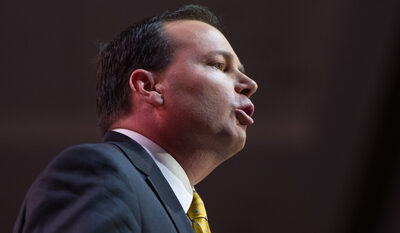Sen. Lee Draws TSA Scrutiny After Demanding Its Elimination

Sen. Mike Lee (R-UT) had a first-hand unpleasant experience this week with the Transportation Security Administration (TSA) shortly after calling for the controversial agency’s dissolution. His personal experience points out the growing discontent among travelers regarding the TSA’s efficacy and approach to ensuring air travel safety.
Lee shared his recent encounter with the TSA’s stringent pat-down procedure on X, formerly Twitter. “Maybe it’s a coincidence. Or not,” Lee wrote, implying his screening was more than a random event.
Are you tired of TSA’s groping?#TSASecurityTheater
— Mike Lee (@BasedMikeLee) March 15, 2024
The patdown procedure came immediately after Lee’s Monday call for a significant shift in airport security management — entrusting airlines with the safety of their flights. Lee argues that the free market and private companies can protect travelers and aircraft without federal oversight.
Senator Lee announced he wanted to abolish the TSA (which is the right move) a few days ago.
Today, he was “randomly selected” for a slow screening and patdown.
The Biden Administration is crushing dissidents.
We are no different than China at this point. https://t.co/Iu4XKCWYN8
— Zach (@TrumpUSA24) March 14, 2024
The senator’s stance resonates with many traveling Americans and influential figures, including conservative radio host Clay Travis and author Cari Kelemen, who have publicly endorsed Lee’s position. Their support underscores a broader conservative critique of the TSA, challenging its effectiveness and constitutionality.
Created in the aftermath of the tragic Sept. 11, 2001, attacks, the TSA was tasked with a critical mandate to secure the nation’s transportation systems. Nearly two decades later, the agency faces accusations of inefficiency and intrusion, highlighted by Lee’s assertion that the TSA undermines the Constitution while inadequately protecting travelers.
Critics, however, remain skeptical of Lee’s proposal. Voices from the political spectrum have raised concerns over the practicality and safety implications of transferring security responsibilities to airlines. They question the feasibility of such a transition and the potential for increased costs passed onto travelers.
Moreover, detractors highlight past failures in airline-managed security and the catastrophic consequences that can ensue from lapses in vigilance. They argue that while the TSA is not without faults, a complete abolition might be an overreaction rather than a solution.
Despite the backlash, the call to rethink the TSA reflects a growing sentiment that current airport security measures, often derided as “security theater,” may not be the most effective or respectful way to protect passengers. An internal probe in 2015 revealing that the TSA failed 95% of its security tests only fueled the debate over the agency’s utility and approach.
Sen. Lee’s bold stance invites a critical examination of the TSA’s role in our post-9/11 world. It challenges Americans to consider whether the current system truly serves the public’s best interests or if a new model, prioritizing efficiency and individual liberties, is overdue. As this conversation unfolds, it is clear that the future of aviation security and the balance between safety and freedom remain at the forefront of national discourse.
